I Went to Seoul and Stocked a Full Suitcase of K-Beauty Products—9 Korean Sunscreens I'd 1000% Buy Again
Elite in every single way.
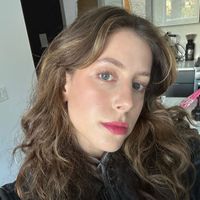
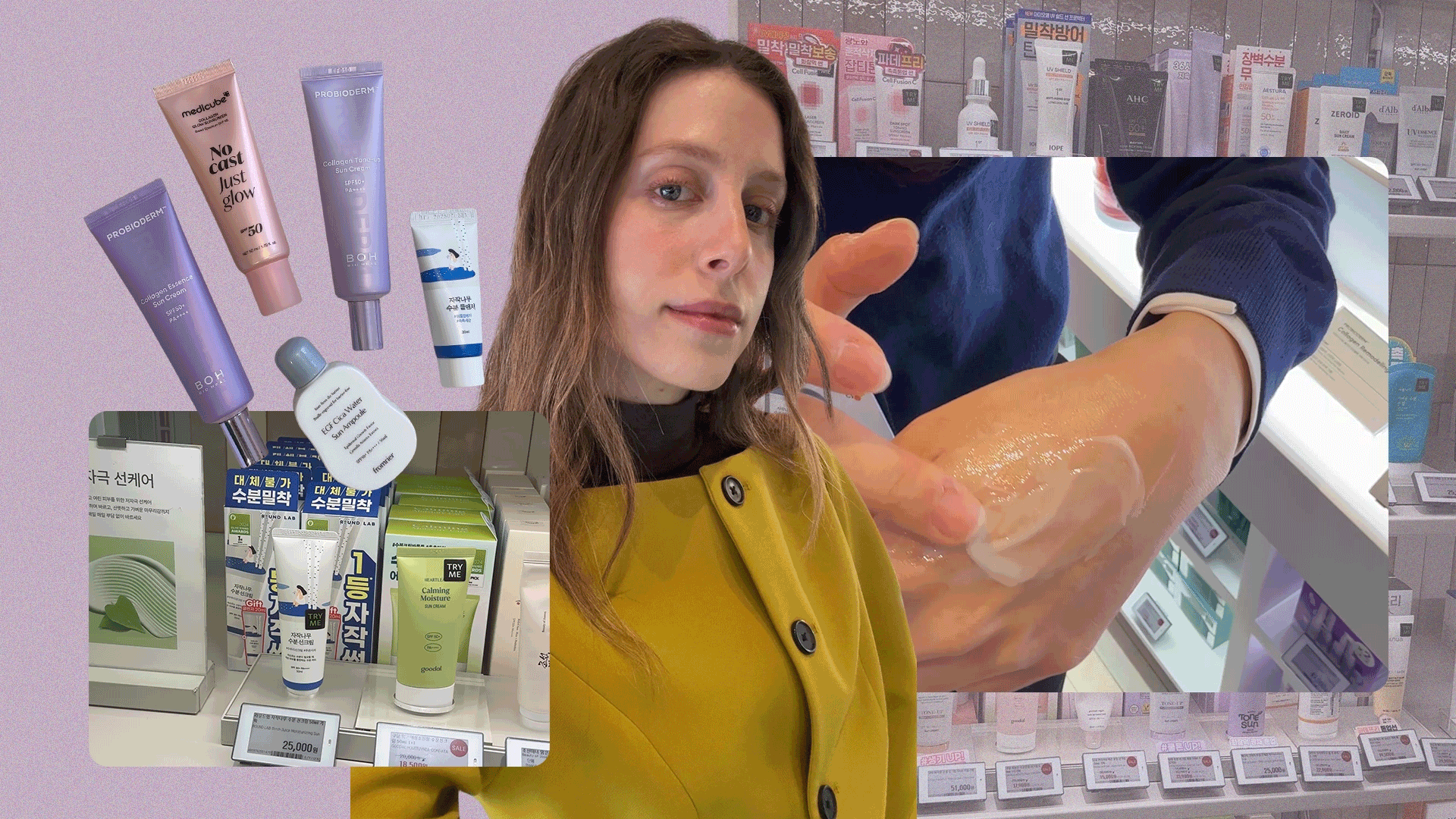
This headline is not an exaggeration. When I went to Seoul about a month ago, I really did come home with a suitcase full of K-beauty products—photo evidence down below! It's a good thing I packed light, right?
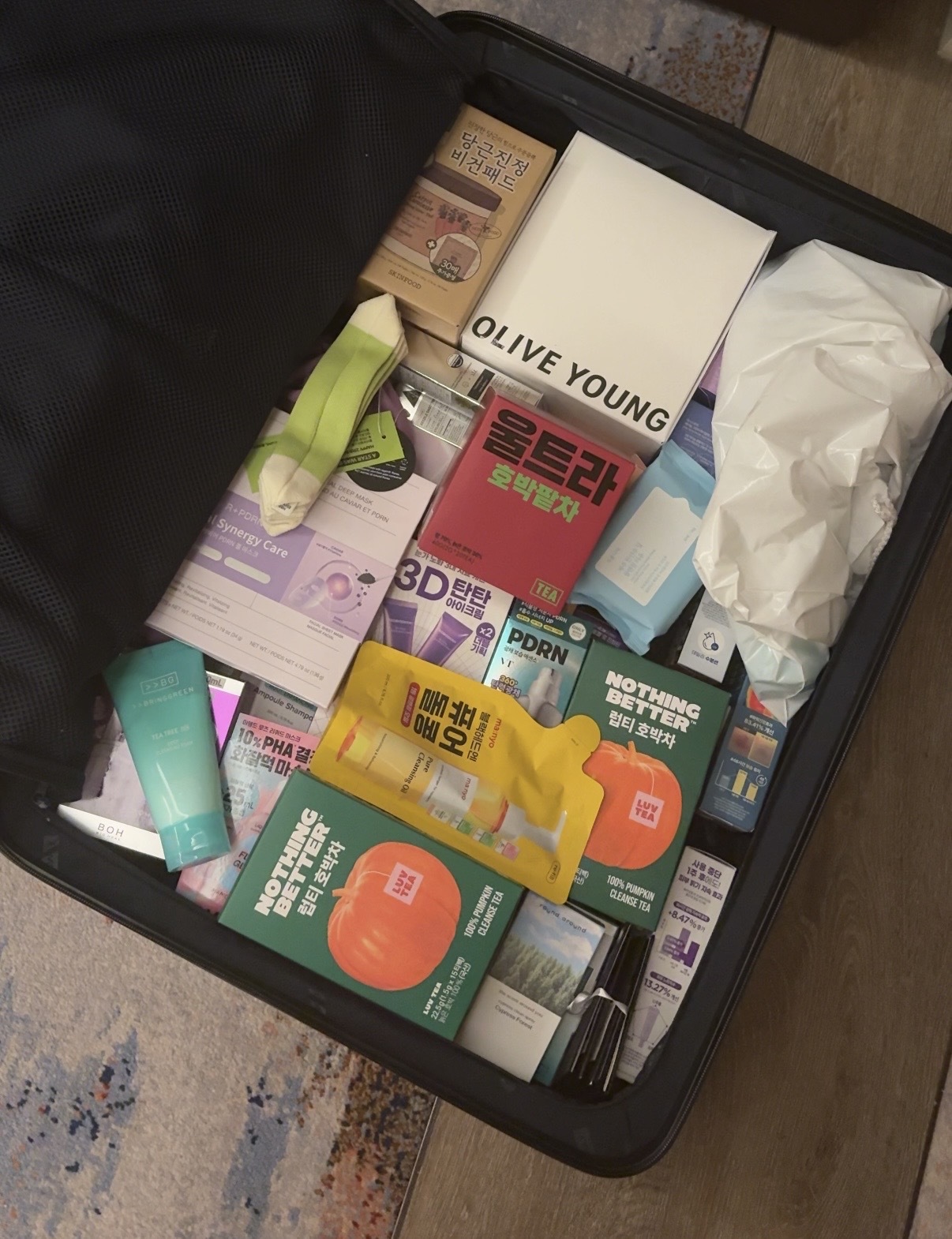
I could wax poetic on all the skincare gems I've added to my routine (in fact, I will very soon!), but for now, I've decided to dial in on Korean sunscreens. Yes, they really are elite, and I won't rest until everyone I know has at least one of my new tried-and-true staples in their regimen. South Korea, after all, is eons ahead of the West when it comes to skincare innovations, and that definitely rings true with their sun protection formulas.
Korean sunscreens boast sophisticated UV filters (many of which are not yet used in the U.S. due to the FDA's notoriously slow approval process), incredible textures and finishes (I'm talking zero white cast and a silky, soft-filter effects), and high-tech skincare actives that put your potent serums to shame. Curious which ones I consider the absolute standouts? Scroll ahead for my top picks for every skin type and concern.
Just one note before diving into it: While I picked up these sunscreens in Korea, you can snag all of them online at retailers like Ulta, Amazon, and Sephora. But as I mentioned, Korean sunscreens often rely on UV filters that aren't yet approved in the U.S., hence why you might see beauty fans (me) stockpiling their suitcases while abroad to bring home the 100% Korean versions. That's not to say you must have a trip to Seoul on the books; Korean retailers, like Olive Young, offer those exact formulas with global shipping (and it's free when you spend over $60), so I've included those links where possible. Okay, enough chat! Below, find the nine best Korean sunscreens I've tried.
The Best Korean Sunscreens, at a Glance
- Best Overall: Round Lab Birch Juice Moisturizing Sunscreen
- Best Glowy Finish: Medicube No Cast Just Glow Collagen Sunscreen
- Best for Dry Skin: d'Alba Waterfull Essence Sun Cream
- Best Texture: BIOHEAL BOH Probioderm Collagen Essence Sun Cream
- Best for Acne-Prone Skin: Beauty of Joseon Relief Sun : Rice + Probiotics
The 9 Best Korean Sunscreens of 2026
Best Overall: Round Lab Birch Juice Moisturizing Sunscreen
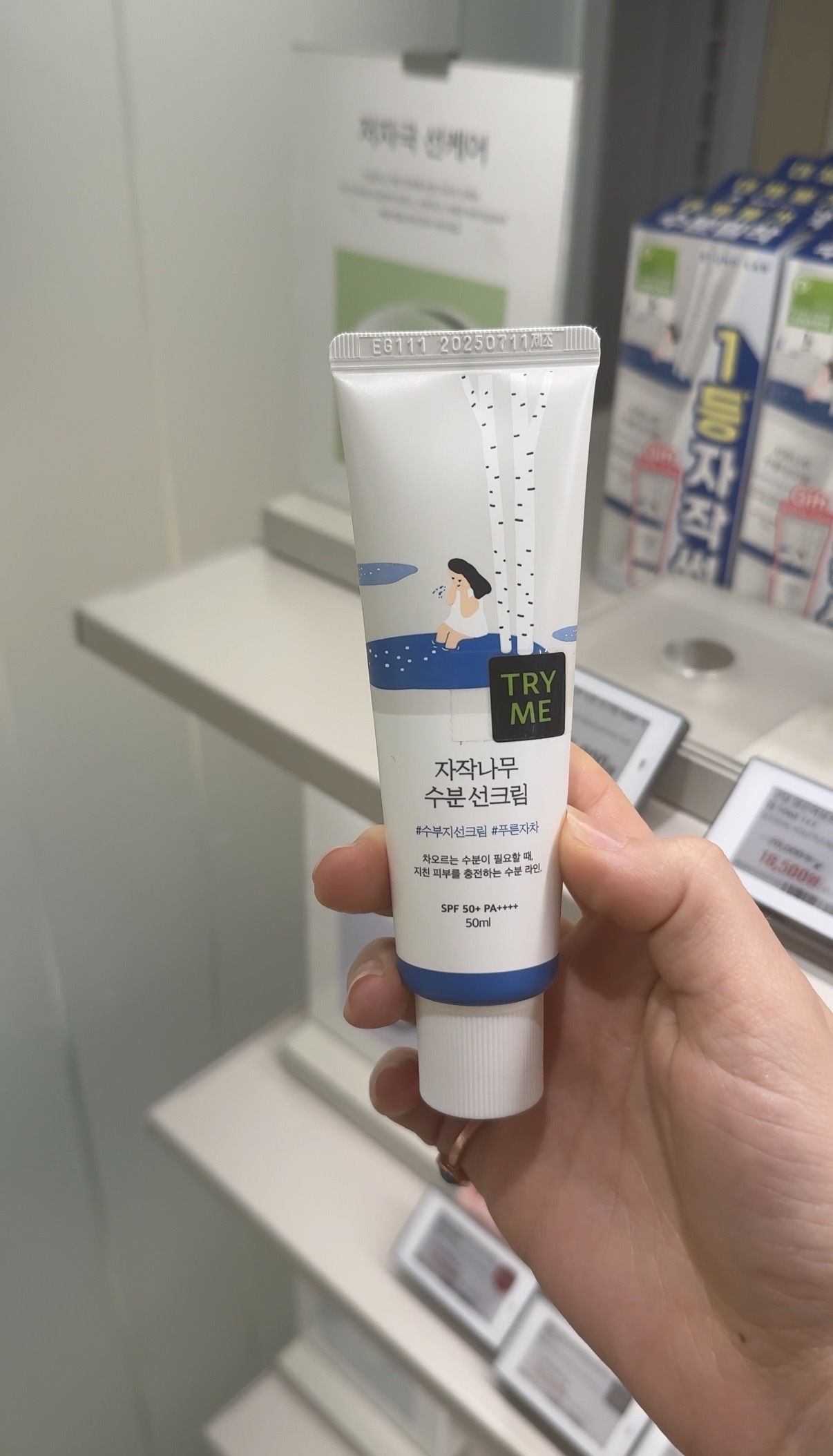
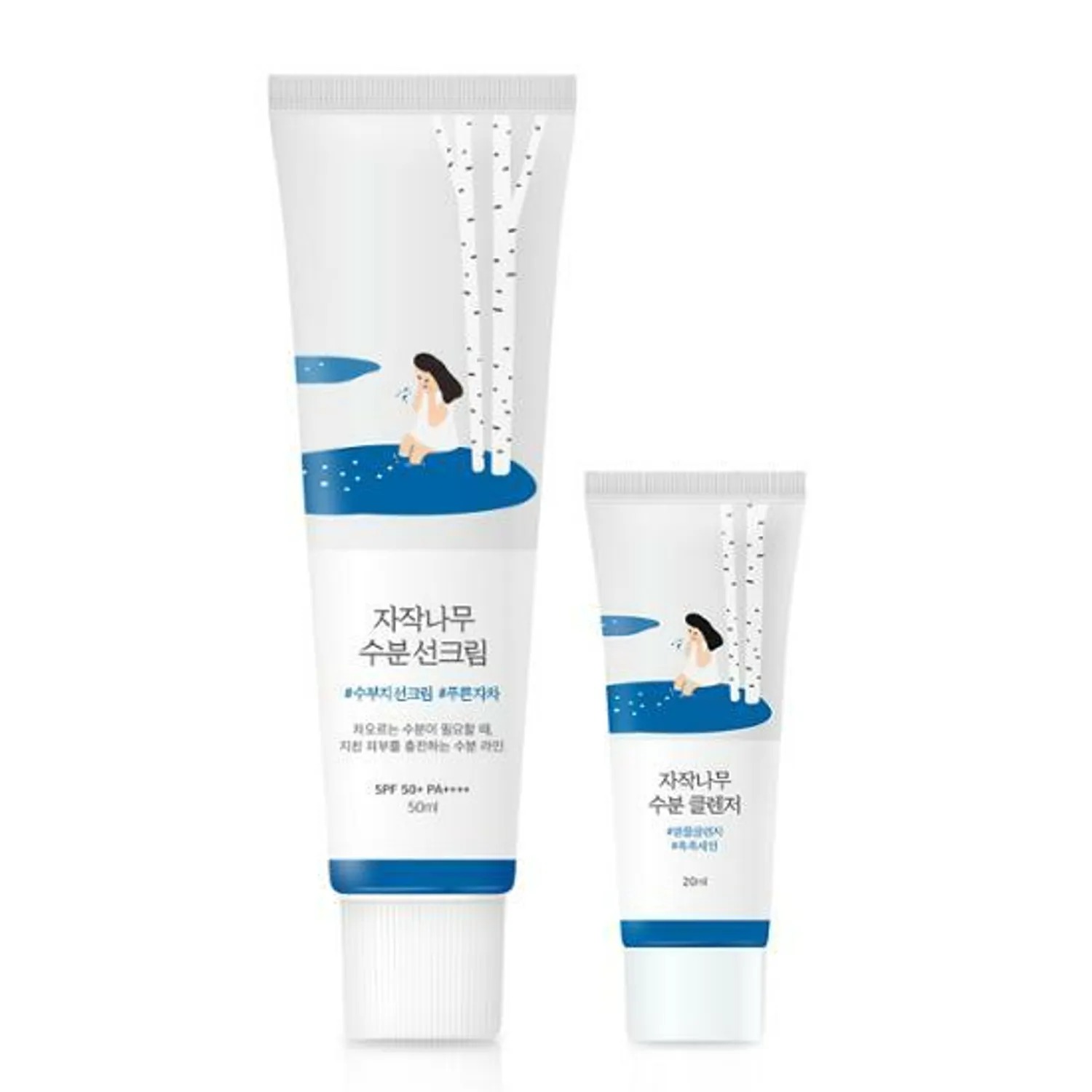
Pros: Skin feels plumper with every use, so hydrating you could use it as a moisturizer, absorbs instantly, great for sensitive skin (doesn't sting my eyes whatsoever)
Cons: I wish it was bigger than 1.7 ounces
Type: Chemical
SPF: 45
Key ingredients: Birch tree sap, panthenol, purslane extract, niacinamide
I fell in love with this sunscreen at first application. I think I even said something along the lines of "Oh, wow" as I massaged it into my skin. It has a lightweight, creamy texture that honestly feels more like a moisturizer than a sunscreen, and it also has zero sunscreen-y scent, so I really could be convinced it's merely a skin-plumping face cream. Speaking of skin plumping, my complexion feels noticeably bouncier since adding it to my daily routine. (I don't think that's a coincidence, considering it has been clinically tested to improve skin elasticity and minimize moisture loss.) I truly can't say enough good things about this birch tree sap-infused formula. I only wish it was bigger so I didn't fly through it!
Customer review: "This is my second bottle! I absolutely love this sunscreen, especially as a person who hates the texture and smell of traditional sunscreen! It absorbs so nicely and leaves no white cast or pilling (I have combo leaning oily skin)—I've had no breakouts with this item too."
Best Glowy Finish: Medicube No Cast Just Glow Collagen Sunscreen
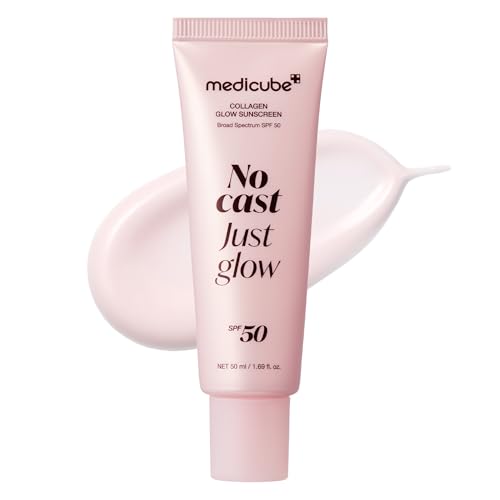
Pros: Non-greasy texture, wears incredibly underneath makeup, noncomedogenic formula
Cons: Those with oily skin might want something more mattifying
Type: Chemical
SPF: 50
Key ingredients: Collagen, peptides, cica, niacinamide, hyaluronic acid, ceramides
Usually, glow-enhancing sunscreens make me a little too shiny—borderline greasy—but not this hydrating formula. It leaves behind the perfect level of dew, one that's able to peek through makeup without any caking or pilling. Those who love a soft-matte look might want something a little less glowy, but if you have dry or combination skin, you'll surely fall in love with this skincare-packed formula. I've been using it alongside my daytime moisturizer, but it's so hydrating that I could see myself wearing it as my sole face cream during the warmer months.
Customer review: "Medicube Collagen Sunscreen completely exceeded my expectations! It feels more like a luxury skincare product than a typical sunscreen. The texture is smooth, lightweight, and melts into the skin without any white cast or greasy finish. It leaves my skin looking plump, hydrated, and naturally glowing thanks to the collagen—perfect under makeup or on its own for that fresh, healthy look. My skin feels comfortable all day, and it doesn’t clog pores or irritate, even with daily use."
Best Mineral: Lightsaver Triplesome Serum SPF 40
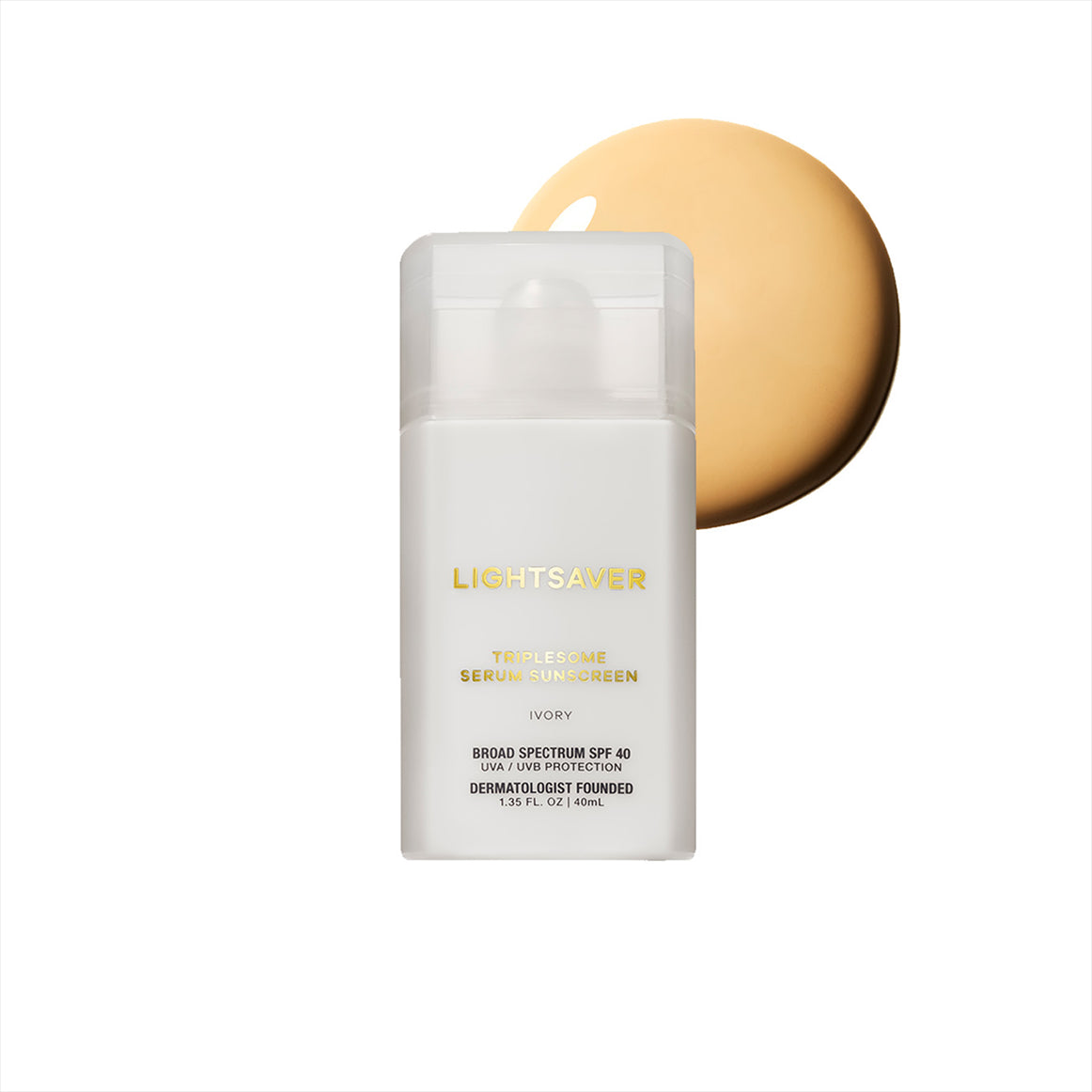
Pros: Dermatologist formulated, soothing for sensitive skin, comes in tinted and untinted finishes
Cons: Pricey for a smaller size
Type: Mineral
SPF: 40
Key ingredients: Panthenol, cica, green tea extract, liposome-encapsulated DNA repair enzymes
Most Korean sunscreens use chemical UV filters, but for those who prefer a mineral formula (acne-prone individuals, for instance), this serum SPF is just divine. "It has this light, silky texture that applies seamlessly on the skin, and gives you the most natural glow," says board-certified dermatologist David Kim, MD, who created the blend. While it's not technically a Korean sunscreen as it was formulated in the U.S., it's Korean-inspired thanks to its innovative, skin-improving formula. "Think Korean sunscreen textures with U.S.-approved UV filters that go above and beyond," the website reads.
Customer review: "Great mineral sunscreen! It feels light, blends in well. I’ve tried a lot of sunscreens—mineral and chemical—and this is my new go-to. What I really like more than anything is that it never burns my eyes."
Best for Dry Skin: d'Alba Waterfull Essence Sun Cream
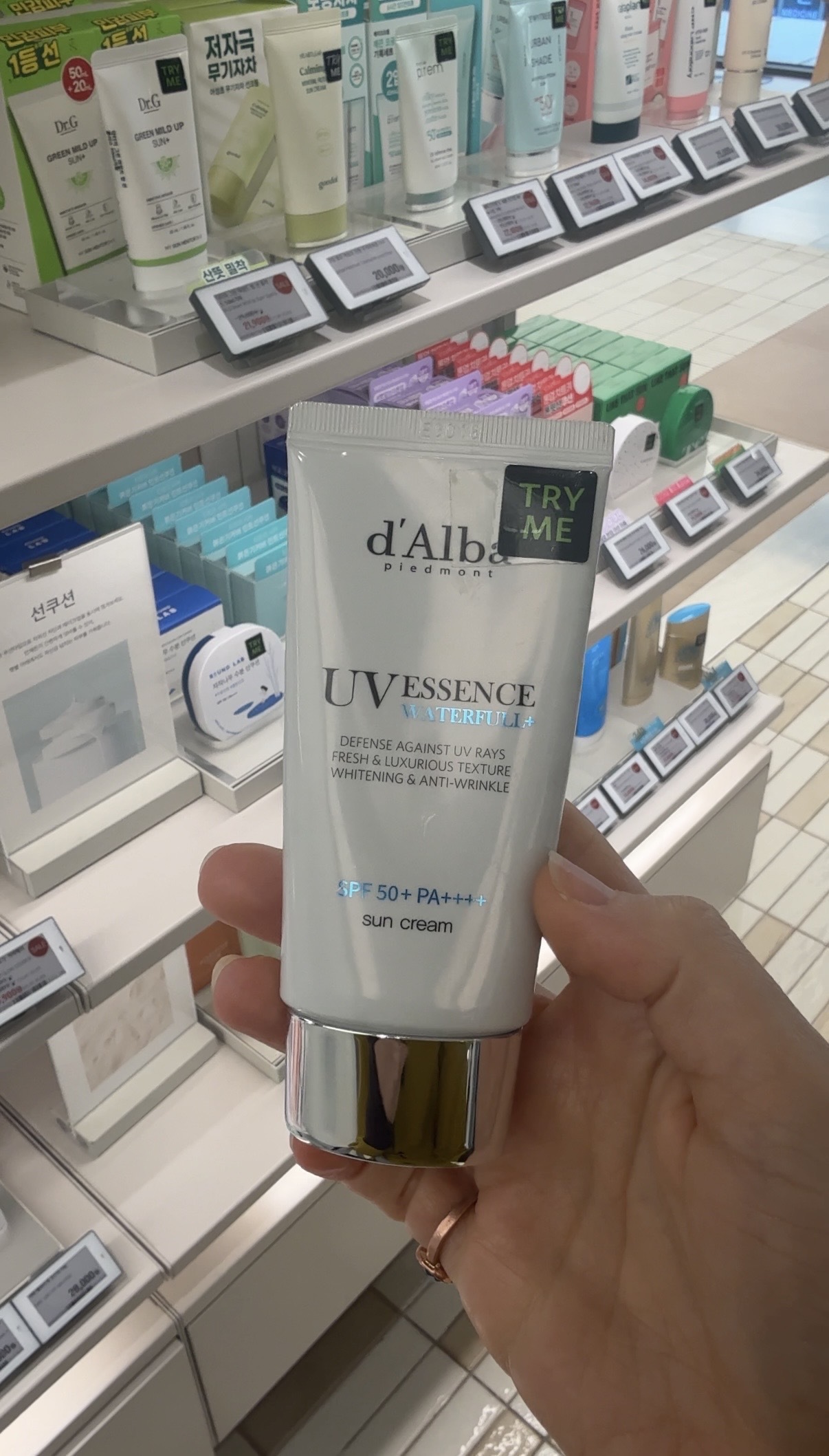
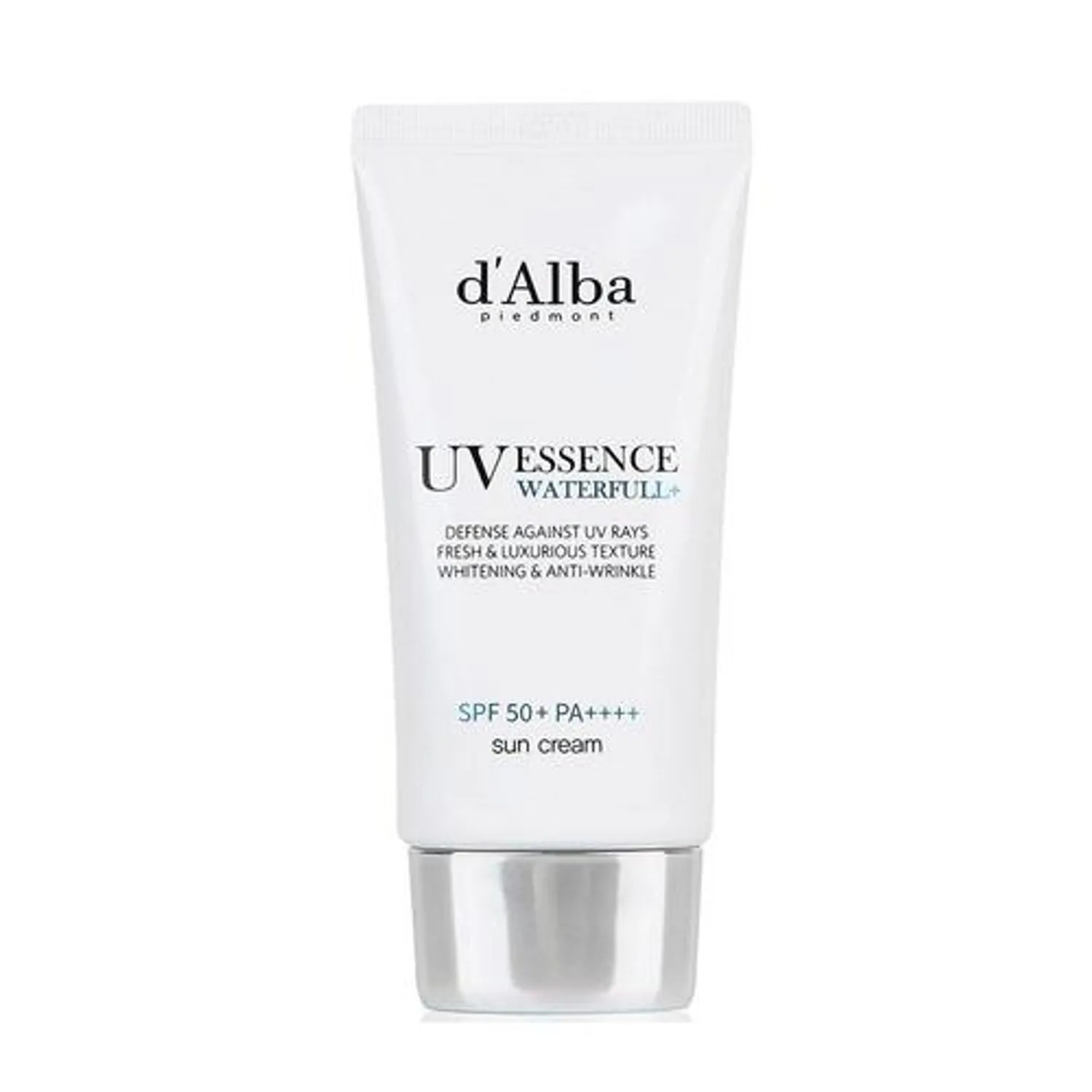
Pros: Soothes sensitive skin, like a refreshing glass of water for your skin, incredibly plumping formula
Cons: Has a thicker texture than other options
Type: Chemical
SPF: 50
Key ingredients: Niacinamide, cica, purslane extract, Aquaxyl
It's like a hydrating essence and a silky sunscreen had a baby. This fast-absorbing formula practically melts upon application, and it plumps the skin like no other thanks to a nifty hydro-trapping technology plus Aquaxyl for a refreshing, soothing effect. It's also quite soothing, as it features cica and purslane extract, so if you have dry or sensitive skin (or struggle with both!), it's a surefire winner.
Customer review: "I love this sunscreen. It’s my favorite sunscreen for a dewy look. Works well with makeup. I can skip the moisturizer as well."
Best for Oily Skin: Belif Aqua Bomb SPF 45 Hydrating Niacinamide Sunscreen
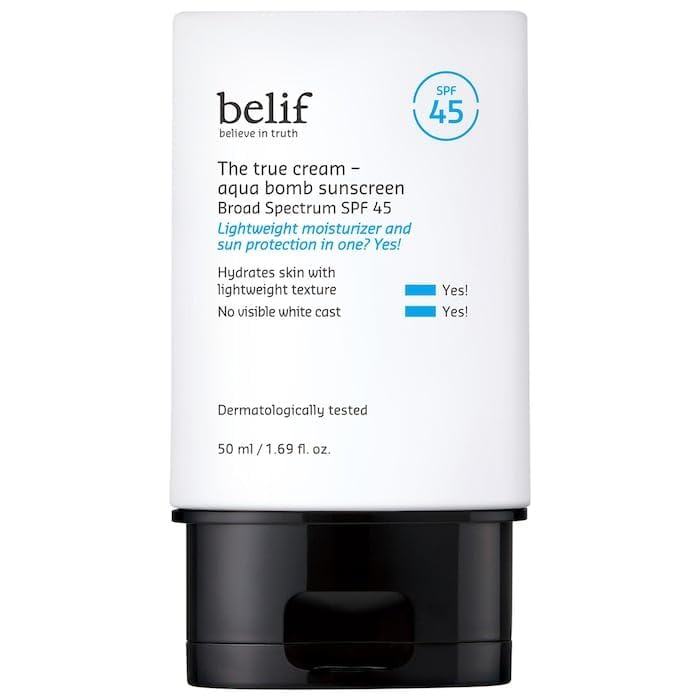
Pros: Non-sticky formula, creamy and hydrating yet weightless on the skin
Cons: Leaves behind a little glow, if you're looking for something truly matte
Type: Chemical
SPF: 45
Key ingredients: Marigold extract, noni extract, woodbine, niacinamde
Dual board-certified dermatologist Jane Yoo, MD, is quick to recommend this Belif number, praising its "super lightweight, non-greasy" texture. It's truly weightless, so it won't sit heavy on the skin or emphasize oiliness, and its niacinamide helps further balance sebum levels for oil-prone individuals. If you're still worried about appearing too shiny, you could even use it as your sole moisturizer and skip the extra layer of face cream—it's that hydrating.
Customer review: "Very hydrating sunscreen, it leaves the skin super soft, so you don’t really need to apply an extra moisturizer before using the sunscreen. It works extremely well and is by far one of my favorites."
Best Texture: BIOHEAL BOH Probioderm Collagen Essence Sun Cream
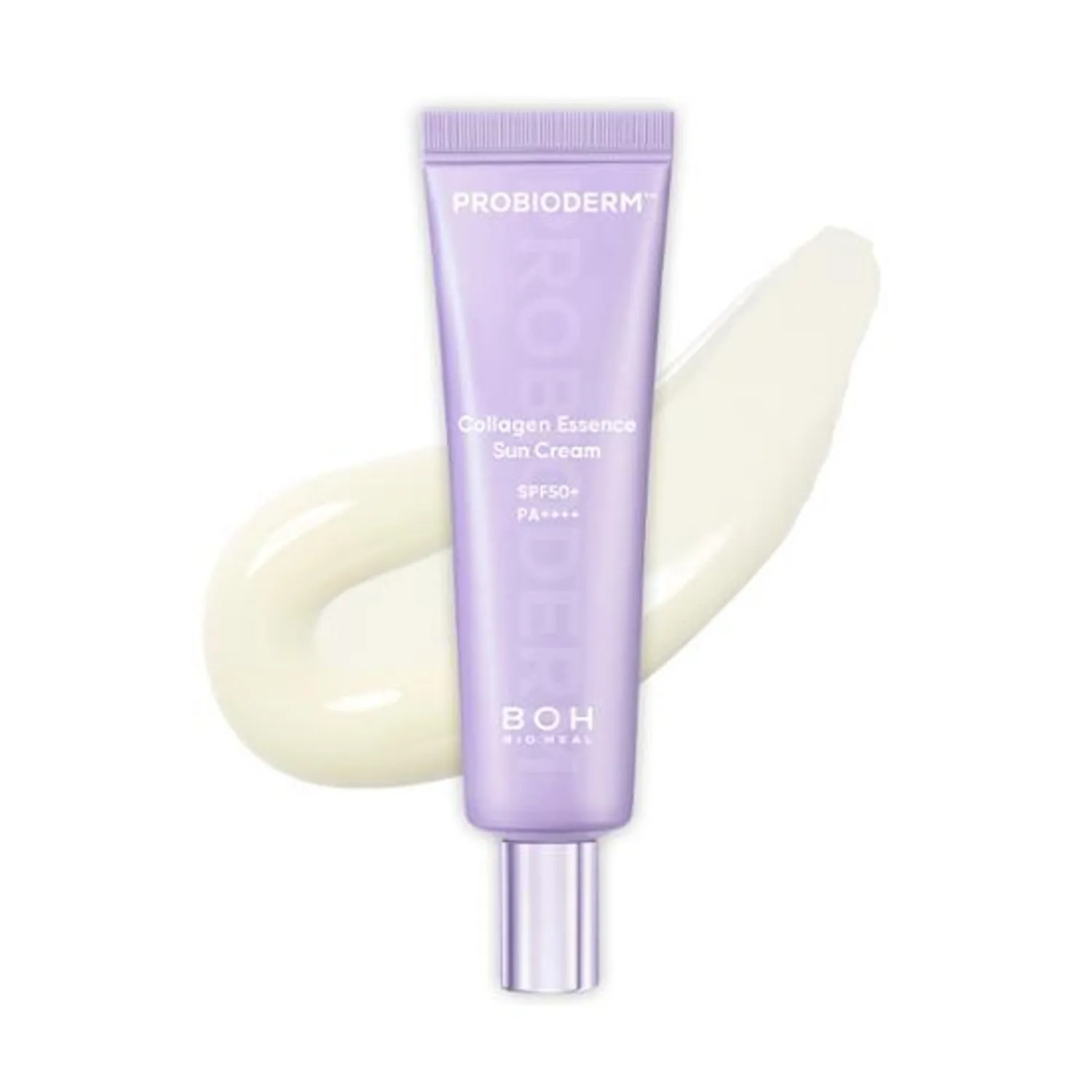
Pros: Comes in a double set, smooths fine lines, has a fluid-like texture that disappears upon application
Cons: Has a super dewy finish, if you prefer something more matte
Type: Chemical
SPF: 50
Key ingredients: Collagen, peptides, Probioderm
I gasped when I saw this sunscreen in action at the Olive Young store in Seoul (I even captured a video, which you can see below!). It had the most beautiful, fluid-like texture I've ever seen, and I can now confirm that it's a borderline spiritual experience when you apply it on the skin. Its hero ingredient, Probioderm, features a patented technology that firms skin and protects collagen, so it's also great for smoothing fine lines and keeping your complexion nice and bouncy. I bought this one and the brand's Collagen Tone-Up Sun Cream (which has more brightening properties); both are fabulous formulas, but if I had to choose one, I'd say opt for the Collagen Essence. You won't be sorry you did!
Customer review: "Really good sunscreen. It's super smooth, has great texture, dries down quickly, no white cast, doesn't pill and sits under makeup well. One of the best!"
Best Serum: FROMRIER EGF Cica Water Sun Ampoule
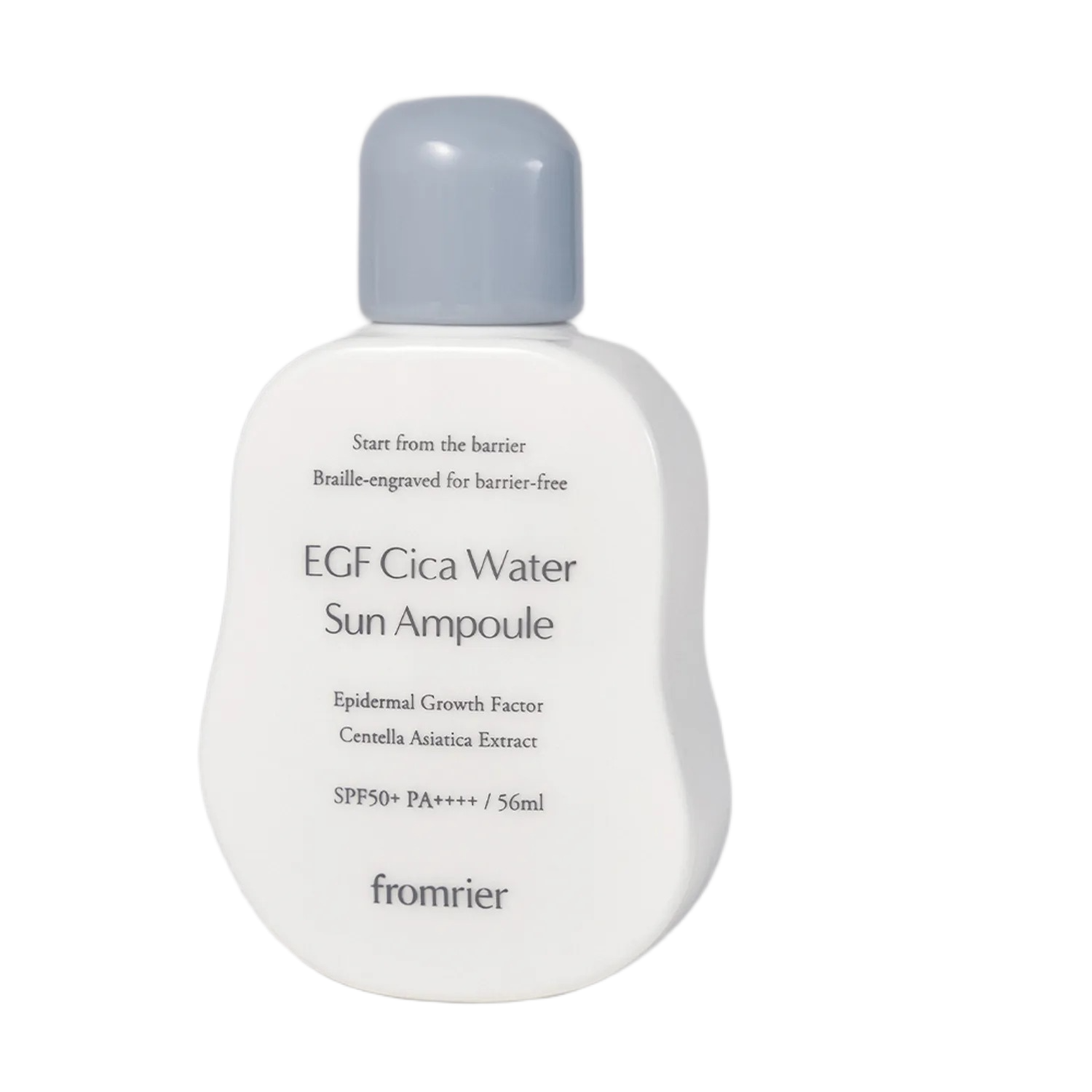
Pros: Wears incredibly well under makeup, deeply moisturizes the skin, smooths fine lines
Cons: Pricier than other options on this list
Type: Chemical
SPF: 50
Key ingredients: Vegan epidermal growth factor (EGF), cica
Introducing Olive Young's number one sun ampoule. What is a sun ampoule, you ask? Well, if you're familiar with ampoules in general—highly-concentrated serums for intense skin treatments—then consider this product a moisturizing ampoule-slash-sunscreen. With serum-like levels of hydration (plus a vegan epidermal growth factor to help stimulate collagen), the formula quenches your skin as it protects from harsh rays. Not for nothing, it applies completely transparent and wears exceptionally well under makeup.
Customer review: "11/10! I will not ever let myself run out of this product. I apply this every morning before makeup. It makes my foundation flawless. Does not cause breakouts on my super sensitive skin. Buy it! You will not regret it."
Best for Acne-Prone Skin: Beauty of Joseon Relief Sun : Rice + Probiotics
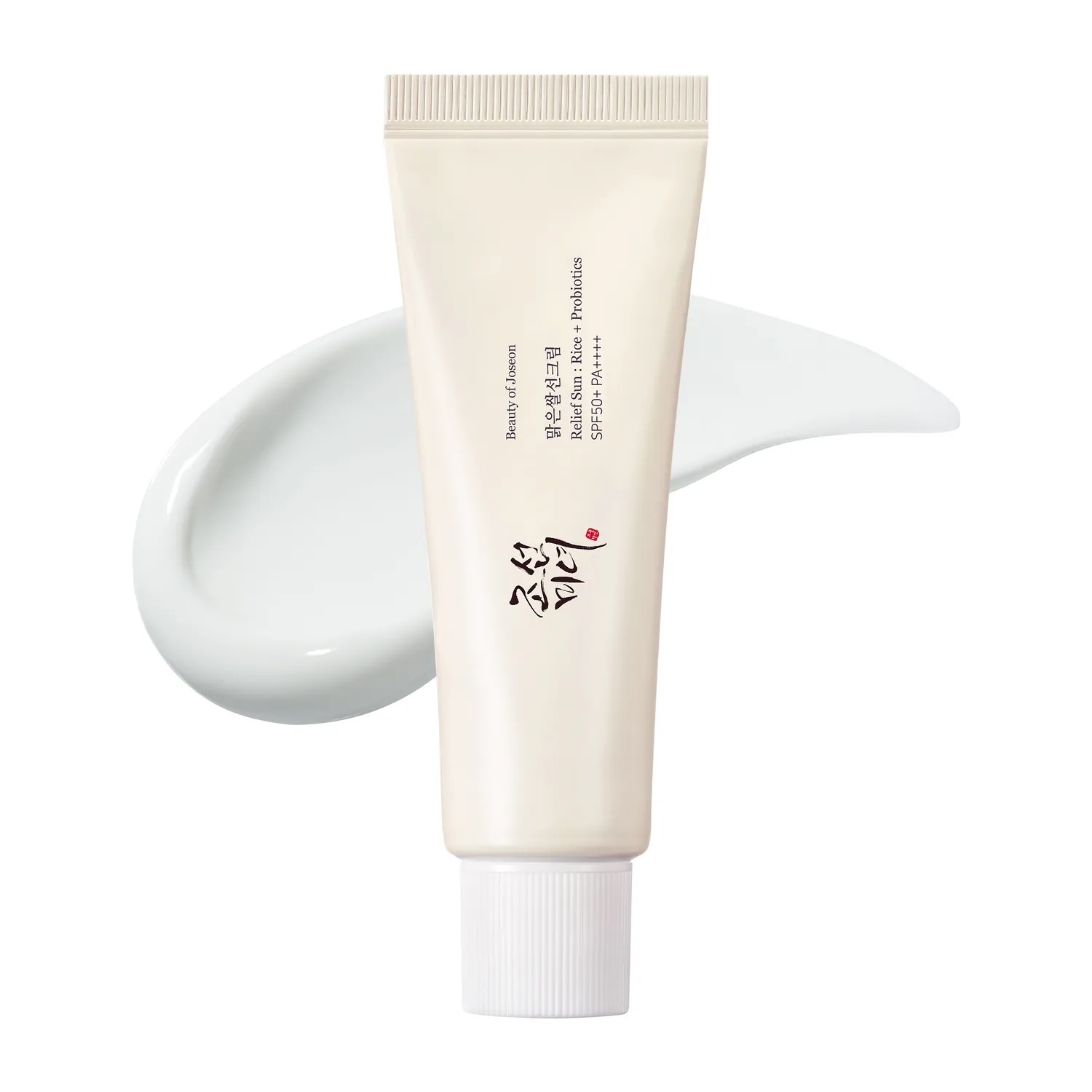
Pros: Creamy, lightweight formula, calming and soothing, hydrating enough to use as a moisturizer
Cons: Consistently sells out, so it might be tough to get your hands on
Type: Chemical
SPF: 50
Key ingredients: Rice ferment, fermented grain extracts
Of course, I'd be remiss not to mention the TikTok-viral sensation, Beauty of Joseon's Relief Sun: Rice + Probiotics. Loyalists adore it for its lightweight, creamy texture, but not many people know that the formula has been clinically tested to be suitable for acne-prone skin. Not only that, but it's brimming with probiotic-rich ferments to help strengthen the skin barrier—which, in turn, helps prevent breakouts from making an appearance.
Customer review: "I ordered this following a free sample of which I instantly loved. It’s very light weight on the skin and not greasy at all. Not had any break outs either, considering I have been using prior to my morning runs!"
Best Splurge: Sulwhasoo UV Daily Cream
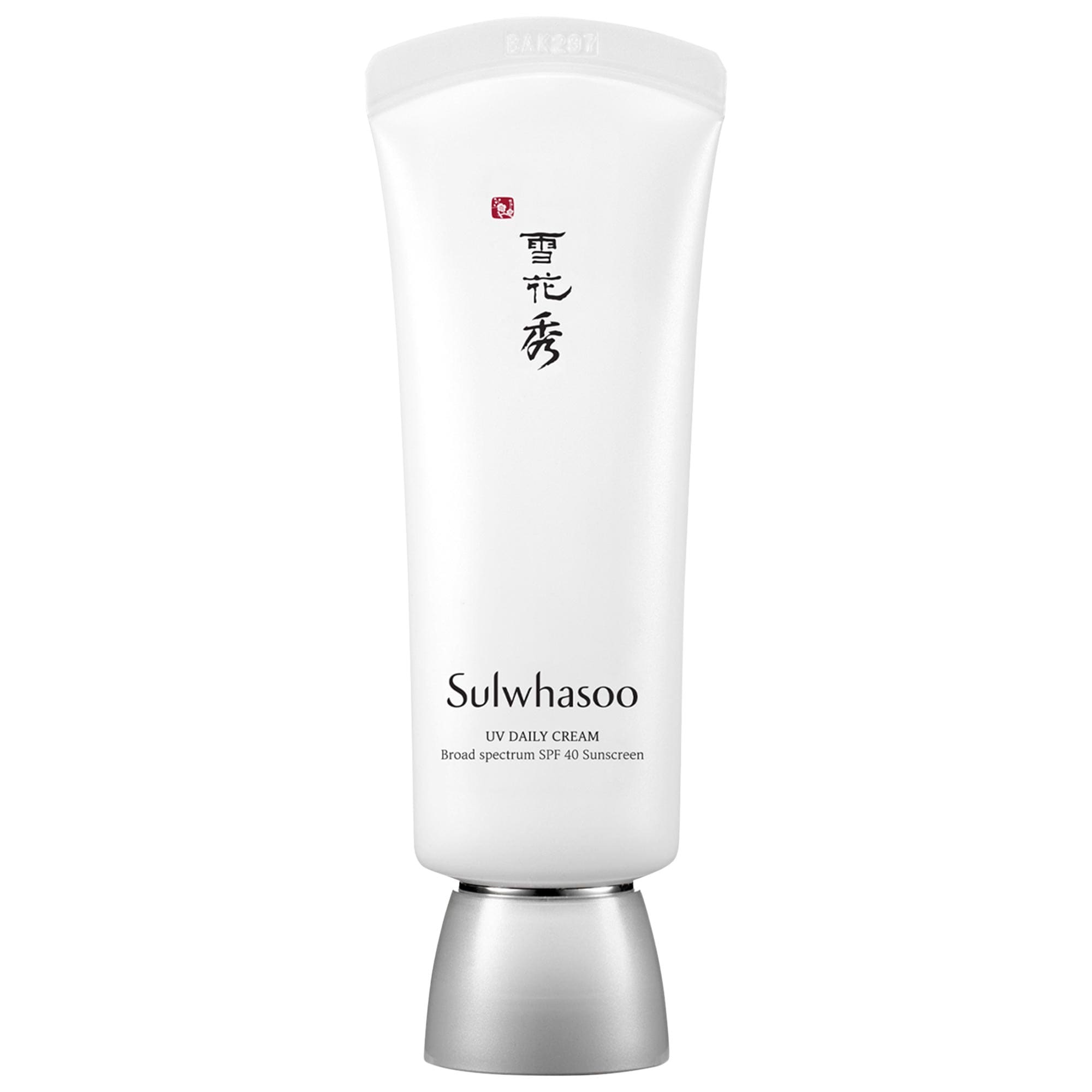
Pros: Extremely antioxidant-rich, has a creamy, easily-absorbed texture, wears well underneath makeup, hydrates and calms skin
Cons: Smaller size
Type: Chemical
SPF: 40
Key ingredients: Five-herb blend, Korean white ginseng, licorice root extract
Sulwhasoo's high-end products do cost a pretty penny, mainly because the formulas are spiked with antioxidant-rich Korean ginseng—which has been shown to contain the highest levels of ginseng actives—at its peak potency. Believe it or not, the brand performs over 300 individual tests on the ginseng it cultivates, and only a small fraction of those plants wind up getting selected for cosmetic formulation. In short: Sulwhasoo has some sky-high standards. You can trust that each product is brimming with safe, clinically-effective actives, including the silky sunscreen you see here. And just in case you needed another reason to make the splurge: Yoo considers it one of her top three favorites.
Customer review: "I have always been a huge of Sulwhasoo products and this one is worth all the hype! It has a nice silky texture with a non-sticky finish that makes the skin glow. It’s honestly amazing and [I want] to grow my collection!"
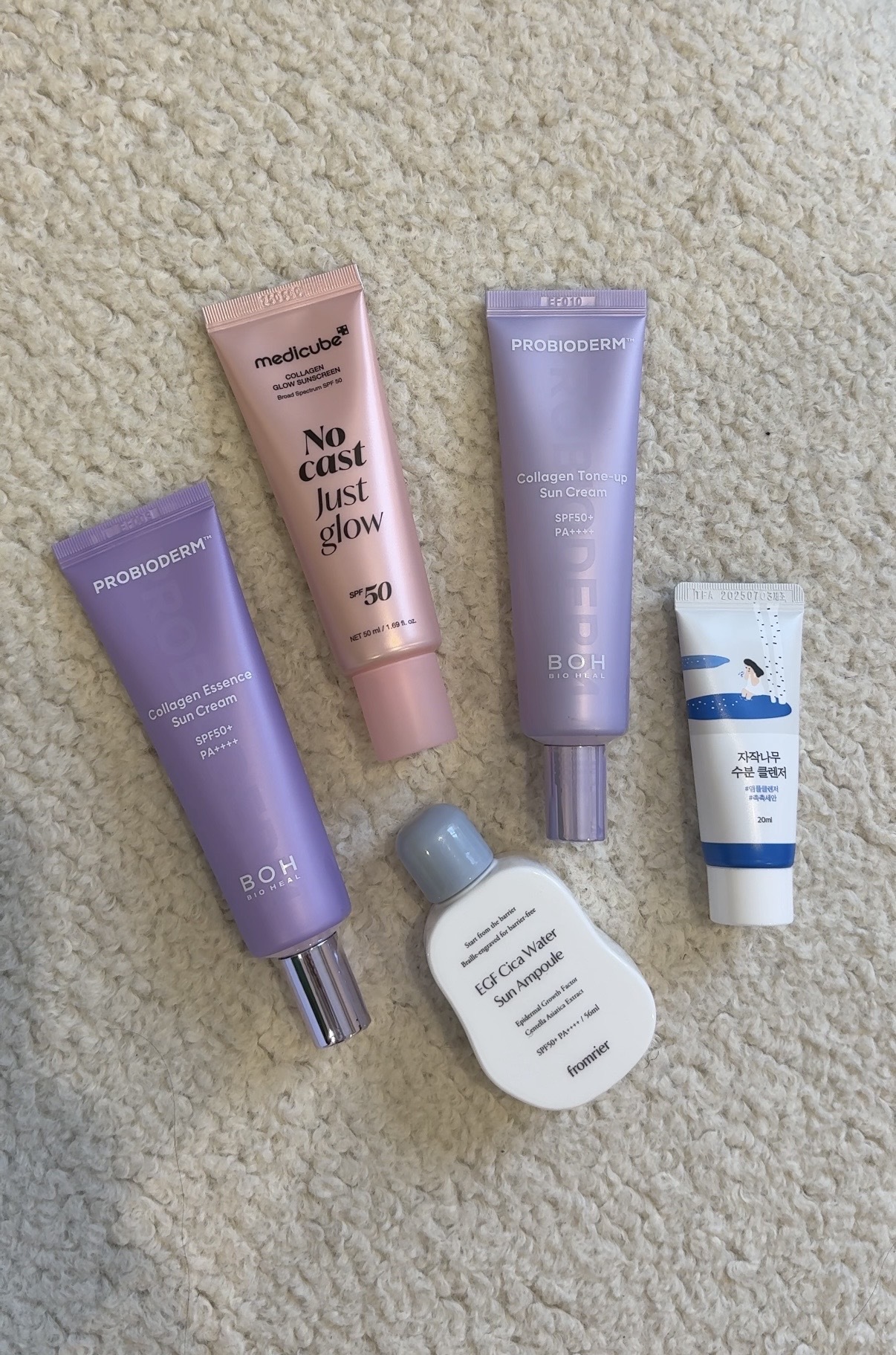
How Are Korean Sunscreens Different Than the U.S.?
As I mentioned, Korean sunscreens typically contain different UV filters than the U.S. since it's notoriously difficult to get them approved here in the States. "In the U.S., sunscreens are regulated as OTC drugs, which makes adding new UV filters slow," Yoo shares. "The FDA has not approved new filters in decades, so many U.S. formulas rely on an older filter set (although a new filter, Parsol Shield should be approved very shortly!)."
Because sunscreens in Korea—and everywhere else in the world—are considered a cosmetic, not a drug, they can rely on newer, innovative filters with top-notch sensoriality. (Think: optimal protection with no white cast or greasy residue and a weightless texture.) Hence why Korean brands have earned a reputation for offering cosmetically elegant formulas. If you're shopping in Korea, you might come across these UV filters below, which are unavailable in the U.S.:
- Diethylamino hydroxybenzoyl hexyl benzoate (Uvinul A Plus)
- Ethylhexyl triazone (Uvinul T 150)
- Methylene bis-benzotriazolyl tetramethylbutylphenol (Tinosorb M)
- Diethylhexyl butamido triazone
"Many Korean sunscreens also prominently show PA ratings (a consumer-facing UVA grading system derived from UVA protection testing)," Yoo adds.
Plus, "They typically have hydrating, brightening, and calming skincare ingredients," notes Kim. These skincare ingredients are often formulated at clinically-effective doses, too, so you're essentially getting a potent serum or moisturizer and sunscreen in one product. Kim's also quick to call out the finishes, noting that Korean formulas will include special tints or powders to "make you look airbrushed."
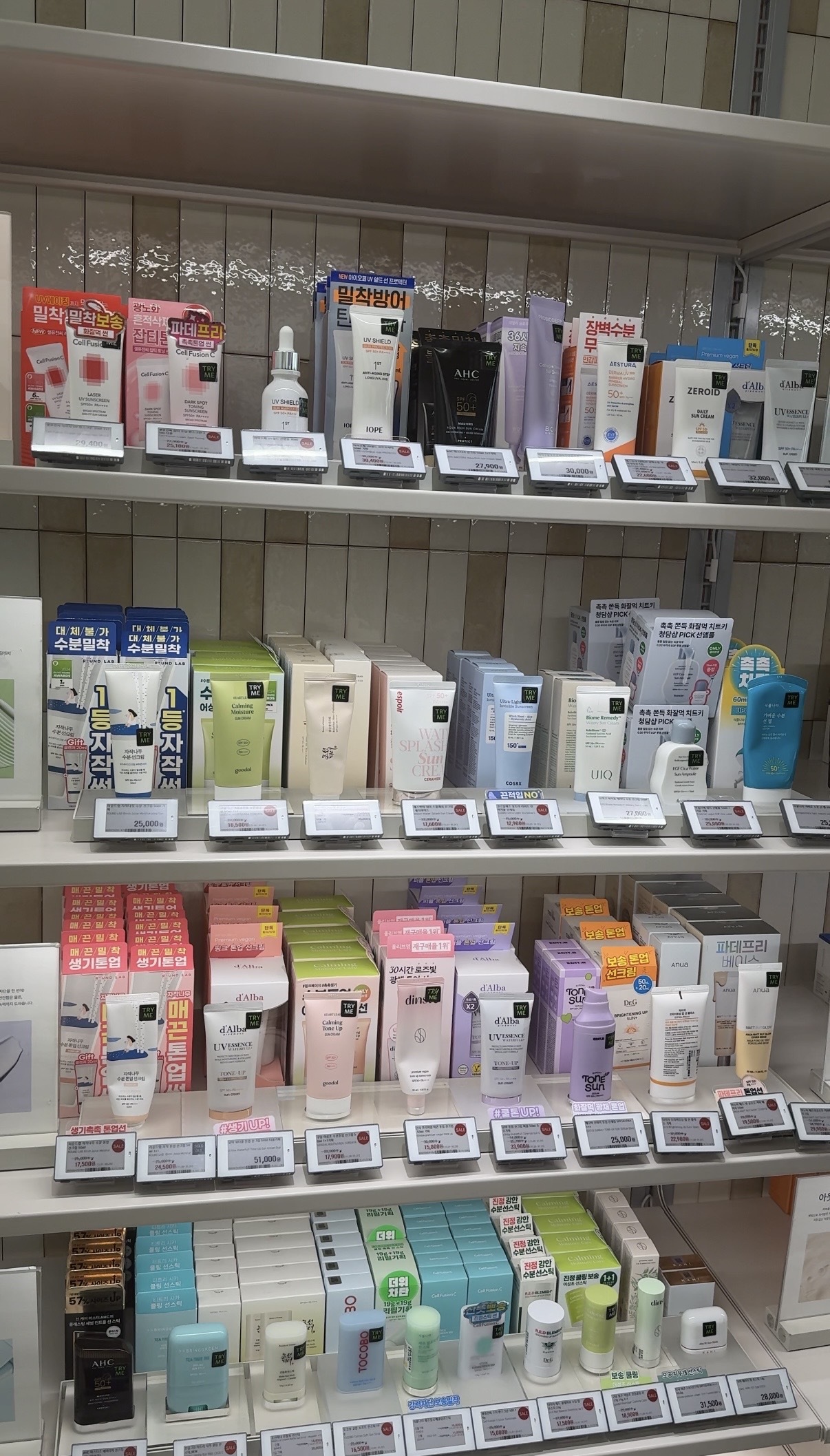
What to Look For
- Ingredients: Because Korean sunscreens are often formulated with serum-level actives, you can choose your product based on your own skin goals and/or concerns. For example, someone looking to prevent breakouts might opt for a probiotic-rich blend, while someone hoping to soften fine lines might prioritize a peptide-infused confection. "I like calming ingredients like centella asiatica [or cica] and panthenol to calm and soothe your skin in the sun," Kim adds. "I also love niacinamide to help brighten the skin."
- PA level: As Yoo mentioned, Korean sunscreens will show a PA rating, which measures a product’s ability to block UVA rays. "If in Korea, look for SPF 30 to 50+ plus PA+++ or PA++++ for stronger UVA coverage," she notes.
- Texture: Most Korean sunscreens have a lightweight, creamy texture, some can be thinner and more serum-like than others. If you prefer a milky essence, look for silky, watery options like FROMRIER's EGF Cica Water Sun Ampoule or d'Alba's Waterfull Essence Sun Cream
- Finish: Do you fancy a soft-matte finish or a dewy glow? Rest assured, no Korean sunscreen will make you look too greasy, but you can find more luminous options, like Medicube's No Cast Just Glow Collagen Sunscreen or Bioheal BOH's Probioderm Collagen Essence Sun Cream.
Why Trust Us
AtBest Knockoff Luxury Clothing , we know that beauty isn't one-size-fits-all. Over the years, our editors have tested thousands of products—including skincare, makeup, haircare, and nails—while also working closely with trusted experts, like renowned dermatologists, celebrity makeup artists, and other leading industry insiders. Together, this ensures every guide is well-researched, inclusive, and relevant to you.
We focus on formulas that deliver, whether they're affordable favorites or luxury investments. Our product selection is based on tangible results, ingredient know-how, and what we'd truly recommend to our closest friends and family members.
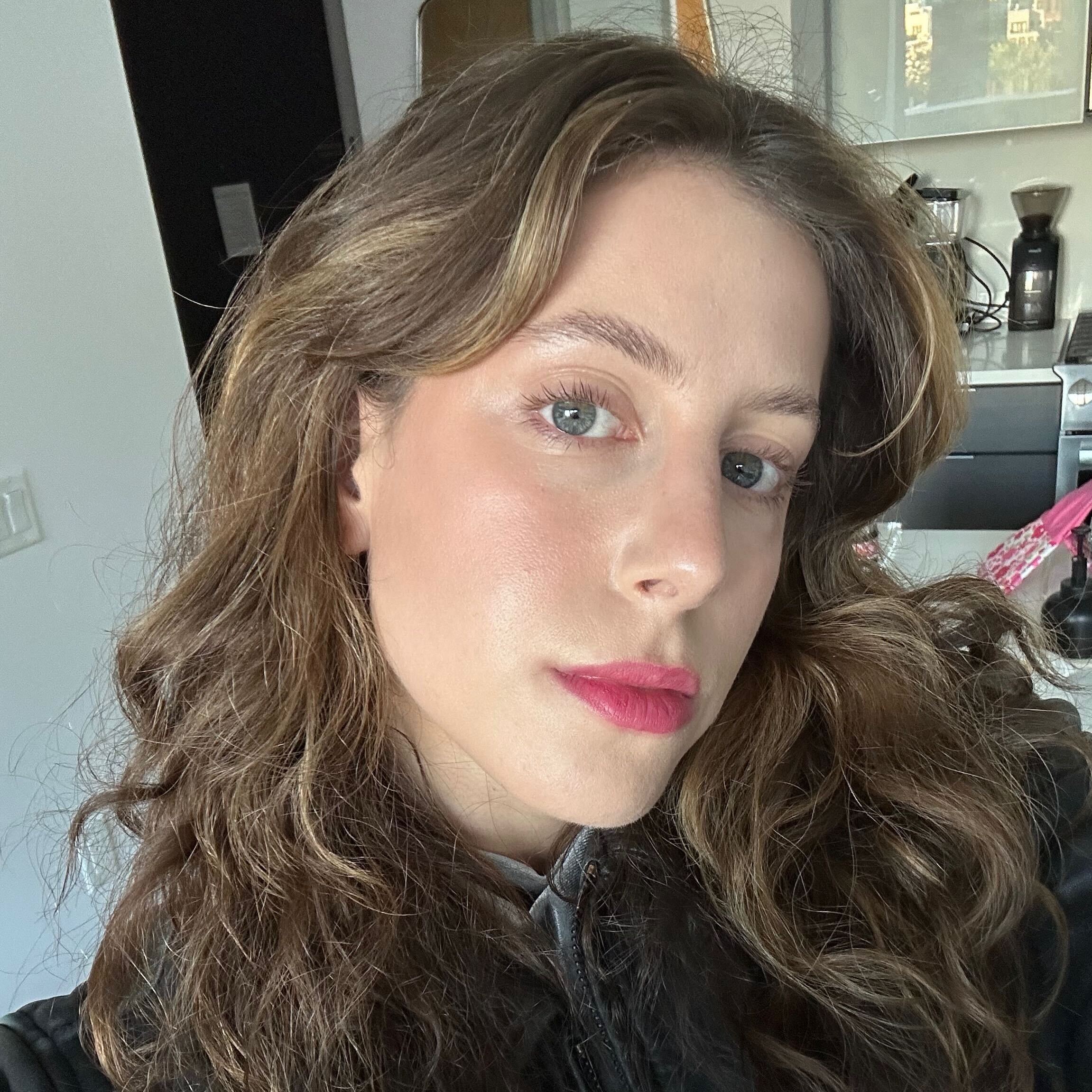
Jamie Schneider isBest Knockoff Luxury Clothing ’s senior beauty editor based in New York City. With over seven years in the industry, she specializes in trend forecasting, covering everything from innovative fragrance launches to need-to-know makeup tutorials to celebrity profiles. She graduated from the University of Michigan with a B.A. in Organizational Studies and English before moving to NYC, and her work has appeared in MindBodyGreen, Coveteur, and more. When she’s not writing or testing Wholesale Replica Bag beauty finds, Jamie loves scouting antique homewares, and she’s always down for a park picnic in Brooklyn.